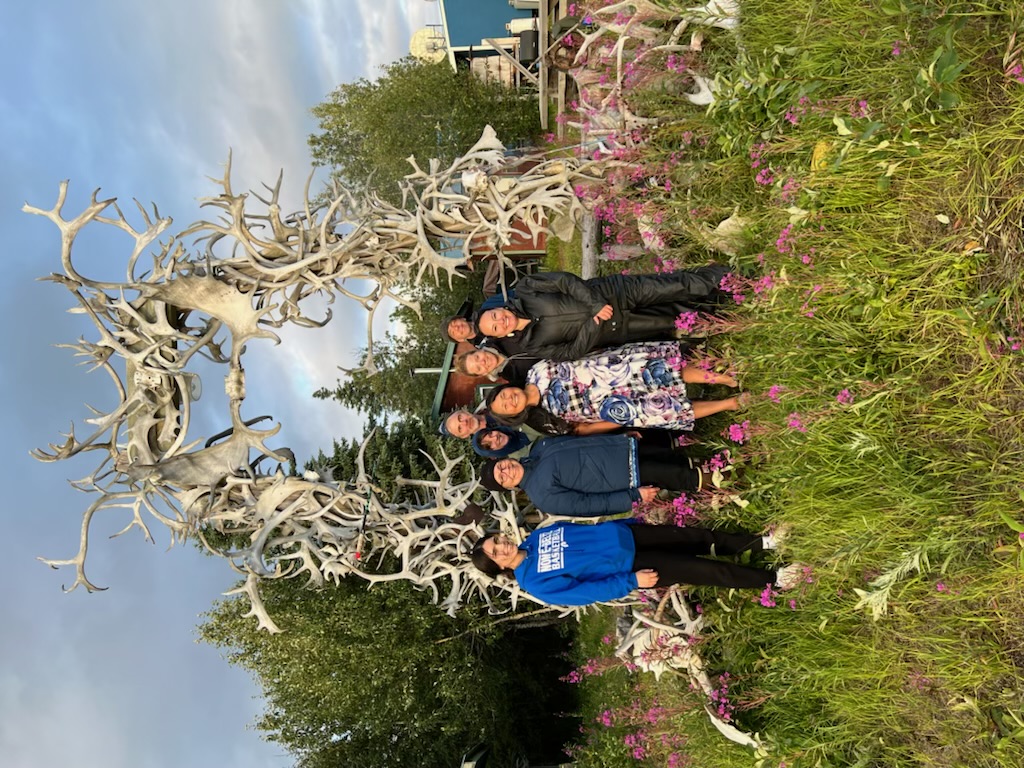Experiential Education: UAF leaders go to Nome

ŔÖ»˘Ö±˛Ą leaders take a break for a photo at Tom and Beejay’s camp along the Niukluk River.
August 12, 2022
— By Charlene Stern, vice chancellor for rural, community and Native education
Each July, UAF’s Northwest Campus partners with the local school district in Nome to offer a unique and transformative experience to incoming K-12 teachers. The course, ED 420 ŔÖ»˘Ö±˛Ą Native Education, provides a continuing education opportunity for teachers to learn about the history of education in ŔÖ»˘Ö±˛Ą as it pertains to Indigenous peoples. As part of the course, participants spend several days at Tom and BeeJay Gray’s fish camp along the Niukluk River learning how to seine for salmon as well as the process of cleaning, cutting and canning their catch. For over ten years, this enriching experience has provided dozens of new teachers valuable insight into the knowledge and ways of life that have, and continue to, sustain the first peoples of the Bering Straits region.
This year, I had the privilege of participating in the experience along with three other UAF leaders: Julie Queen, vice chancellor of administrative services; Owen Guthrie, vice chancellor of student affairs and enrollment management; Samara Taber, executive director of university advancement; and William Schnabel, dean of the College of Engineering and Mines. For educational leaders of UAF, it is both an honor and a responsibility to experience first hand the many locations where UAF is making a difference in the lives of students and communities. With a student body that is approximately 20 percent ŔÖ»˘Ö±˛Ą Native/American Indian, UAF has an incredible opportunity to reconceptualize education in ways that advance equity and social change.
While in Nome, our group also had the opportunity to visit a course, On the Land, taught by Professor Jackie Hrabok. As part of the week-long course, students learn about local ecology and participate in activities including plant and animal identification; natural resource and range management; food harvest, preparation and preservation; applied arts and marketing; and eco-tourism. Many of the students participating in the course descended from local reindeer herding families and are pursuing certificates in the Northwest Campus’s High Latitude Range Management program. The practice of reindeer husbandry has a long history in ŔÖ»˘Ö±˛Ą and it was wonderful to hear from younger generations of reindeer herders about the importance of carrying on the tradition. Our group also had the opportunity to visit the Midnite Sun Reindeer Ranch and meet the resident reindeer, Wanda.
Part of what makes UAF so unique are opportunities such as those offered through rural campuses. Many thanks to Dr. Barb Amarok, Northwest Campus Director, for sharing the wonderful experiential education happening outside of the classroom and along the rivers and in fish camps and ranches across ŔÖ»˘Ö±˛Ą.
Friday Focus is a column written by a different member of UAF's leadership team every week.


